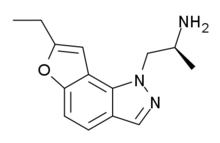YM-348
YM-348 is an indazole derivative drug which acts as a potent and selective 5-HT2C receptor agonist, with an EC50 of 1nM and 15x selectivity over 5-HT2A, although it only has moderate selectivity of 3x over the closely related 5-HT2B receptor.[1][2] It has thermogenic and anorectic effects in animal studies, making it potentially useful for the treatment of obesity.[3][4][5][6]
 | |
| Identifiers | |
|---|---|
| |
| CAS Number | |
| PubChem CID | |
| IUPHAR/BPS | |
| ChemSpider | |
| CompTox Dashboard (EPA) | |
| Chemical and physical data | |
| Formula | C14H17N3O |
| Molar mass | 243.310 g·mol−1 |
| 3D model (JSmol) | |
| |
| |
| (verify) | |
References
- Kimura Y, Hatanaka K, Naitou Y, Maeno K, Shimada I, Koakutsu A, et al. (January 2004). "Pharmacological profile of YM348, a novel, potent and orally active 5-HT2C receptor agonist". European Journal of Pharmacology. 483 (1): 37–43. doi:10.1016/j.ejphar.2003.10.004. PMID 14709324.
- Shimada I, Maeno K, Kazuta K, Kubota H, Kimizuka T, Kimura Y, et al. (February 2008). "Synthesis and structure-activity relationships of a series of substituted 2-(1H-furo[2,3-g]indazol-1-yl)ethylamine derivatives as 5-HT2C receptor agonists". Bioorganic & Medicinal Chemistry. 16 (4): 1966–82. doi:10.1016/j.bmc.2007.10.100. PMID 18035544.
- Hayashi A, Sonoda R, Kimura Y, Takasu T, Suzuki M, Sasamata M, Miyata K (June 2004). "Antiobesity effect of YM348, a novel 5-HT2C receptor agonist, in Zucker rats". Brain Research. 1011 (2): 221–7. doi:10.1016/j.brainres.2004.03.032. PMID 15157808.
- Smith BM, Thomsen WJ, Grottick AJ (March 2006). "The potential use of selective 5-HT2C agonists in treating obesity". Expert Opinion on Investigational Drugs. 15 (3): 257–66. doi:10.1517/13543784.15.3.257. PMID 16503763.
- Nilsson BM (July 2006). "5-Hydroxytryptamine 2C (5-HT2C) receptor agonists as potential antiobesity agents". Journal of Medicinal Chemistry. 49 (14): 4023–34. doi:10.1021/jm058240i. PMID 16821762.
- Wacker DA, Miller KJ (July 2008). "Agonists of the serotonin 5-HT2C receptor: preclinical and clinical progression in multiple diseases". Current Opinion in Drug Discovery & Development. 11 (4): 438–45. PMID 18600561.
This article is issued from Wikipedia. The text is licensed under Creative Commons - Attribution - Sharealike. Additional terms may apply for the media files.